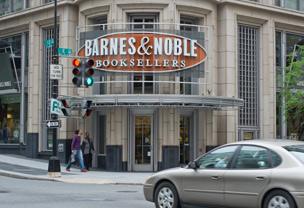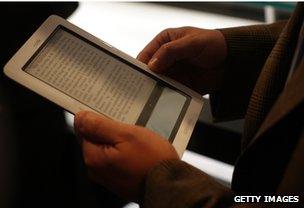The Nook - too late to catch the Kindle?
- Published
- comments

The e-reader and tablet markets are sorted, right? Amazon owns the e-reader business with its Kindle, Apple's iPad dominates in tablets, with a bit of room at the cheaper end for Google's Nexus and the Kindle Fire. But a giant US book chain begs to differ.
Barnes and Noble has unveiled its plans for an assault on the UK market this morning. It will be offering British customers its Nook range of e-readers, along with new colour tablet computers, the Nook HD and the Nook HD+.
I had a briefing earlier this week, and got a chance to look at the devices. At first glance they seem worthy competitors to the Kindles, iPads and Nexuses. The Nook Simple Touch Glowlight, for instance, is a touchscreen e-reader with an inbuilt light which enables you to read in bed in the dark without disturbing your partner.
Backing up the impressive hardware is the Barnes and Noble online store, offering 2.5 million books, all of the leading newspapers and magazines and plenty of movies and TV series.
It seems a compelling offering and Barnes and Noble, which has grabbed 27% of the e-book market in the US, hopes to make a big impact in the UK. It believes its e-readers will prove more attractive than the Kindle, and its Nook colour tablets will give the Google Nexus and the Kindle Fire - when it arrives in the UK - a run for their money.
But here's the problem - it may be too late, the die may already be cast. In the smartphone market, hopeful executives from Nokia and Microsoft insist that the race has only just started because most of the world has yet to get a smartphone.

The original Nook was launched in 2009
Similarly, Barnes and Noble can point out that most people have not yet got an e-reader or a tablet so there should be room for all sorts of new entrants.
The trouble is that in both markets, the early adopters have chosen the winners - Apple and Samsung in smartphones, Apple, Amazon and maybe Google in e-readers and tablets. And when consumers new to these markets ask friends what they should buy, they are likely to be told to get whatever those early adopters have chosen.
New devices may have better screens, superior battery life, and be lighter or thinner than the market leaders - but it's increasingly hard for consumers who aren't experts to differentiate between them. I waved a Nook around at a techie gathering this week, and most people thought it was a Kindle.
Given the huge dominance of Amazon in e-books - and Apple in tablets - many will be wishing Barnes and Noble well as it tries to carve itself a place in the UK market. More choice is surely a good thing. But a brand that is virtually unknown in the UK may struggle to get consumers to snuggle down with a good Nook rather than cosy up to a Kindle.